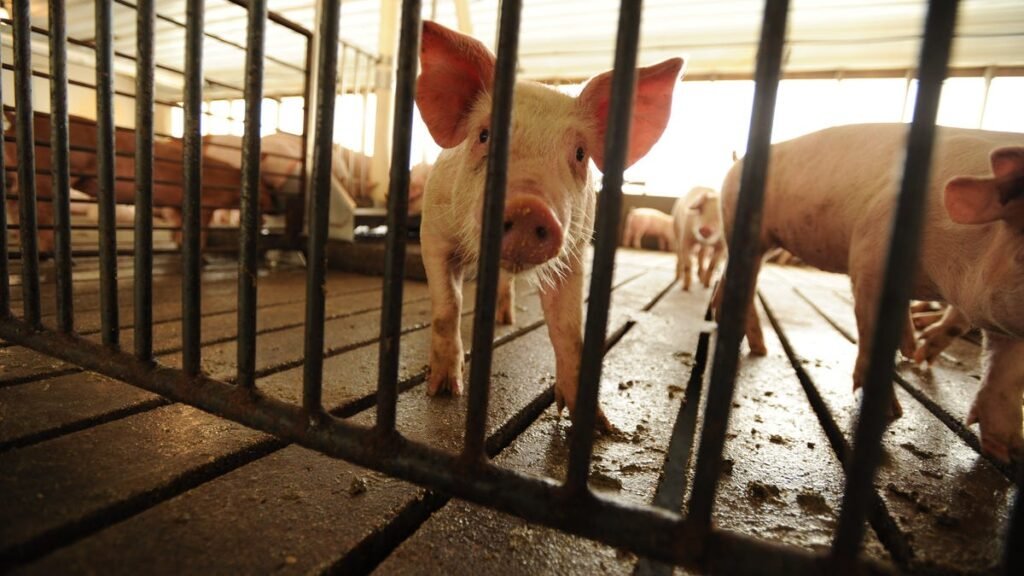
USA Today Women of the Year nominee talks women in agriculture
Jan Middendorf is USA Today’s Kansas Nomination for 2024.
The Kansas Supreme Court has affirmed judgments against a pig farmer whose pipes for liquified hog waste trespassed against a neighbor and created a nuisance odor.
The seven justices unanimously ruled Friday that Norman Terry Nelson and his industrial hog-farming operation in northwest Kansas could not invoke the state’s right-to-farm law, which can shield farmers from nuisance liability, because he could not rely on the presumption of “good agricultural practice.”
The dispute among neighbors could have broader implications for farmers and ranchers in Kansas.
Liquified hog waste bothered neighbors
Nelson operates a hog facility and farmland near Almena in rural Norton and Phillips counties. As part of his operations, “Nelson transports water to the facility, and liquified hog waste from the facility, via pipes buried along a county road in the road right of way.”
Justice K.J. Wall, writing for the court, said Nelson’s “hogs generate enormous volumes of waste,” which is treated before being piped to nearby farmland to be used as fertilizer via a center-pivot irrigation system.
“But this arrangement has ruffled more than a few feathers — or should we say wrinkled more than a few noses,” Wall wrote.
Nelson’s neighbors, Tonda and Rodney Ross and Laura Field, sued Nelson and his corporate entities, Stillwater Swine, Husky Hogs and NTN. They alleged that Nelson’s pipes, which carried water from the farmland to his facilities and treated pig waste from his facilities to his farmland, trespassed on private land and had created a nuisance.
The Rosses “own a farmhouse that sits just across the road from the cropland where Nelson sprays the effluent,” and they alleged that it had caused “odors and fly infestations.”
The court said that Nelson argued that “applying animal waste to farm ground in a rural agricultural area” cannot “be an actionable nuisance as a result of producing smells that bother nearby residents.”
The lawsuit resulted in a Phillips County District Court jury awarding trespass damages that were reduced slightly by the court to $63,360 for each of the Rosses’ and Field’s properties, plus $2,000 in nuisance damages. The court also awarded $50,000 in punitive damages. The Kansas Court of Appeals later affirmed.
Private pipelines under public highway were trespass
Nelson installed his private pipelines in the subsurface of a county road. While the Rosses own the land, including the subsurface of the road, the roadway has a public highway easement.
The justices said “a public highway easement is limited to public uses that facilitate the highway’s purposes of travel, transportation, and communication.” While easements commonly have utilities like gas pipelines, electric lines and telephone lines that serve the public, Nelson had no right to “permanently occupy a portion of the highway for private and exclusive use.”
Since the pipelines fell outside the scope of an easement, Nelson was trespassing because he did not have permission from the Rosses.
More: Industrial livestock operations are on the rise in the Midwest. Kansas case could be key.
Kansas right-to-farm law doesn’t protect hog farmer
Kansas has laws protecting farmland and agricultural activities against nuisance lawsuits, intended to prevent agricultural activities from being forced off agricultural land by the encroachment of nonagricultural land uses.
Those statutes, known as right-to-farm, establish that existing agricultural activities are generally presumed to be reasonable and not a nuisance as long they are “consistent with good agricultural practices.”
Nelson tried to invoke those laws to shield his spraying of effluent from nuisance liability. The courts rejected that argument because the pipeline trespass meant that his activities did not conform with other state laws, which meant he was not entitled to a legal presumption of good agricultural practices.
The Kansas Livestock Association and Kansas Farm Bureau had submitted an amici curiae brief to the appellate court arguing that a different subjection of the statute better fit the facts. But the high court declined to address how that subsection would have applied because Nelson did not make that argument and previously asserted that it did not apply.
More: Hog farmer fined $152K for illegal construction
Ag lobbyists have pushed to rewrite the law
The livestock association has lobbied legislators to change state law. In 2022, the KLA pushed for House Bill 2531, which would have allowed counties to authorize agricultural pipelines in the right-of-way without landowner permission.
Supporters argued that the litigation could have ramifications for other agricultural businesses that also use pipelines in road right-of-way. Opponents argued that it would violate private property rights while treating agricultural producers as public utilities.
While the bill made it out of the House Agriculture Committee, it never got a vote on the House floor.
Jason Alatidd is a Statehouse reporter for The Topeka Capital-Journal. He can be reached by email at jalatidd@gannett.com. Follow him on X @Jason_Alatidd.

